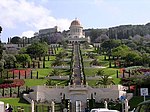Amatu'l-Bahá Rúhíyyih Khánum (born Mary Sutherland Maxwell; 8 August 1910 – 19 January 2000) was an American-born Canadian Hand of the Cause of the Baháʼí Faith. She was the wife of the Ottoman-born Iranian religious figure Shoghi Effendi, who succeeded his grandfather ʻAbdu'l-Bahá to become the Guardian of the Baháʼí Faith between 1921 and 1957. Appointed as a Hand of the Cause in 1952, her primary responsibility was to expand and protect the global Baháʼí community. In this capacity, she was among the leading Hands of the Cause who, following Effendi's death in 1957, took on the role of ensuring the transfer of the religion's supreme legal authority to the Universal House of Justice, which has governed out of Haifa, Israel, since 1963.
Khánum was born to Canadian architect William Sutherland Maxwell and American spiritualist Mary Ellis Bolles, both Christians who later became Baháʼís. As an adolescent, she embarked on two pilgrimages to Haifa's Baháʼí World Centre, where she first met Effendi, whom she would marry in 1937. Owing to the fact that Effendi died without having any children, she was regarded by many Baháʼís as the last remaining link to his great-grandfather Baháʼu'lláh, who founded the Baháʼí Faith in Iran and the Ottoman Empire in the 19th century.
For much of the latter half of her life, Khánum actively ventured throughout many parts of South America, sub-Saharan Africa, Asia, and the Pacific Islands, where she worked to establish and develop local Baháʼí communities. During this time, she published a number of books and documentaries, and was also officially received by the United Nations and many countries' governments. In 2004, the Canadian Broadcasting Corporation placed her at number 44 on the voters' list of "greatest Canadians" for the television series The Greatest Canadian.
At the age of 89, Khánum died in Haifa and was laid to rest at the Baháʼí World Centre in the city.







